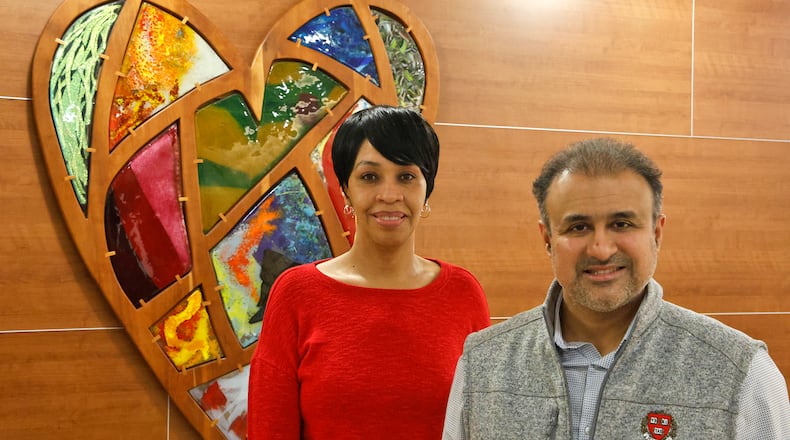The instrument technician and sterile processor had been experiencing nausea, occasional headaches, minor chest pain and slight dizziness. She said that morning, before her husband was due to go out of town, he tried to get her to take a sick day, but she decided to push through and go to work.
Pope said by talking to her coworkers and care team, she learned that one of her coworkers found her unconscious in a chair in the break room. She had no pulse and wasn’t breathing. She said her coworkers’ quick actions saved her life.
“I had a 100% blockage and I needed two stents, so my body was running low, but there were signs for maybe quite some time and I really ignored them,” Pope said. “At my age I wasn’t thinking heart attack, even though my father passed away almost two years ago from congestive heart failure ... that should have been something that I was paying more attention to.”
Pope’s experience is not out of the norm for women experiencing cardiac events, Mercy Health cardiologist Dr. Muhammad Ashraf said. When women have heart attacks, they often do not experience pain in the left arm or major chest pain. More often, he said they experience nausea, pain in the right side of the abdomen and fatigue.
Ashraf said it is crucial to seek medical care when there are any symptoms close to the heart.
“A simple test, an EKG can save your life,” Ashraf said.
People often ignore or downplay the signs of a heart attack or other major health event because they’re scared of facing such a danger, Ashraf said.
Ashraf said he has personally seen the negative effects of ignoring symptoms, with a relative of his who was an interventional cardiologist ignoring his body and dying. A surgeon with whom Ashraf worked in his fellowship training died at home after experiencing heart burn and one of his doctor coworkers told him to take medication and not worry about it.
Lori Blanton-Baugh, cardiology director, said that often patients tell her that they waited to come in because they thought what they were feeling was “probably nothing” and they didn’t want to be a bother.
“I don’t know how many times I’ve told people, ‘It’s OK; we want you to come see us. If it’s nothing, that’s great,’” Blanton-Baugh said.
Healthy eating, exercise and stress relief habits are the most important in preventing heart attacks, Ashraf said.
“We need to make time for ourselves,” Ashraf said. “We have to detach from our cell phones and destress at least for half an hour a day. Just take all the stress out.”
Since COVID-19, Ashraf said he has been seeing younger patients experiencing heart attacks. Pope said she had COVID-19 twice.
It is important for everyone to regularly see a primary care provider, Ashraf said.
Pope said that before her heart attack, she had been eating better and taking better care of her body. But that didn’t make up for years of eating unhealthy foods and not taking proper care of herself.
Pope said since her heart attack, she has experienced an outpouring of support from her coworkers, and she hopes to return to work next month if her doctor clears her. She has the option of switching departments if the heavy lifting her job sometimes requires is too much of a challenge.
“I didn’t know it but there were so many people around that cared,” Pope said.
Credit: LaTeisha Pope
Credit: LaTeisha Pope
Pope said that she thinks women in particular are likely to brush their symptoms off and put others before themselves. She has learned to stay in tune with her body.
“Don’t ignore your body. Don’t ignore those little things,” Pope said. “Even though you may think it’s something small ... if it’s happening more than a day, get it checked.”
February is American Heart Month. It highlights heart disease, which is the No. 1 killer of people in the U.S.
About the Author


